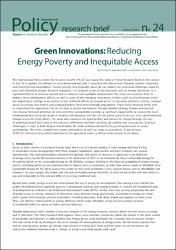Please use this identifier to cite or link to this item:
https://repositorio.ipea.gov.br/handle/11058/15367Files in This Item:
| File | Description | Size | Format | |
|---|---|---|---|---|
| en_IPCPolicyResearchBrief24.pdf | 149.63 kB | Adobe PDF |  View/Open |
| Title: | Green Innovations: Reducing Energy Poverty and Inequitable Access |
| Authors: | Stoycheva, Daniela P. |
| Abstract: | Access to basic services is a universal human right, and access to a decent ‘quality’ of water, energy and food are key to sustainable human development. With them, people’s capabilities, opportunities and basic freedoms can expand exponentially. This interconnectedness between the quantity and quality of resources is expressed in the definition of energy access by the UN Secretary General in his declaration of 2012 as the International Year of Sustainable Energy for All and the launch of the Sustainable Energy for All (SEE4ALL) initiative. Defined as “the physical availability of modern energy services, including electricity and improved end-use devices such as cookstoves, to meet basic human needs at affordable price” (Sustainable Energy for All, 2012), ‘access’ thus relates to more than availability; it also captures factors such as affordability and relevance. For poor people, this implies that the price of modern energy should be, to some extent, in line with their ability to pay and comparable to the cost and effort of accessing traditional fuels. (…) |
| metadata.dc.rights.holder: | International Policy Centre for Inclusive Growth United Nations Development Programme |
| metadata.dc.rights.license: | O texto e dados desta publicação podem ser reproduzidos desde que as fontes sejam citadas. Reproduções com fins comerciais são proibidas. |
| metadata.dc.type: | Policy Research Brief |
| Appears in Collections: | Publicações do IPC-IG |
Items in DSpace are protected by copyright, with all rights reserved, unless otherwise indicated.

